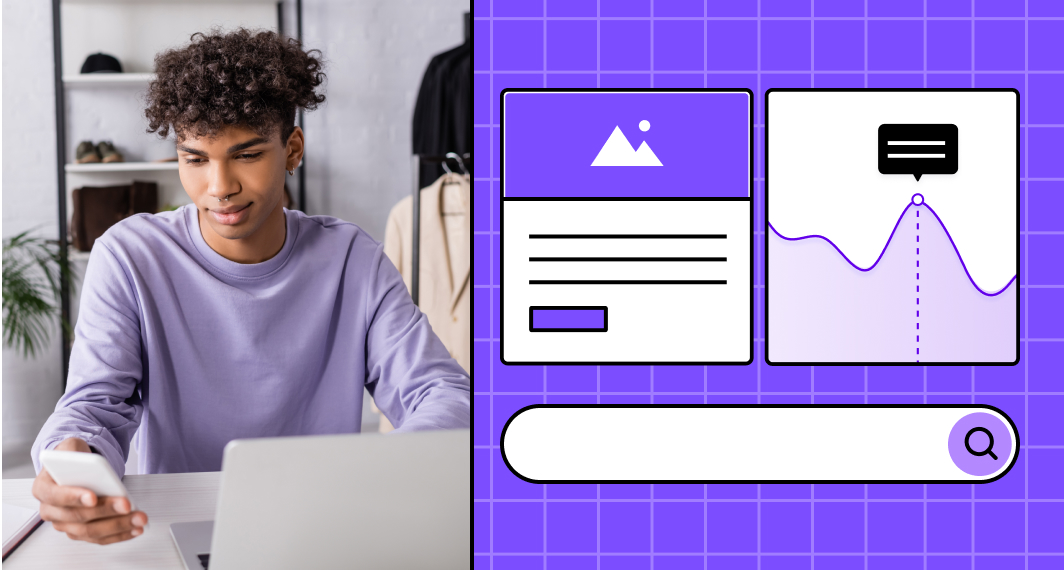At Builder, we want to turn the software development landscape on its head by making it super simple for anyone to turn their idea into a product. Naturally, this leads us into the questions of how software development and indeed, mobile app development, is changing. Considering the future of AI, we’re always curious how this technology will continue to advance mobile app and software development in the years and decades ahead. Are you curious how AI will transform the development landscape? Read on, Builders.Let’s start with the topic of innovation. Innovation isn’t always about finding a new way. It’s also about finding an incrementally better way of doing something. In the world of technology, innovation comes from simple tweaks and plugs that can transform the way humans interact with technology. Ultimately, we believe this is one of the most important innovations in technology--how we interact with it.
Thanks to the ever-growing use of the internet, websites and other online platforms, the world creates more than 2.5 quintillion bytes of data everyday. What’s more, 90% of the world's data has been created in the past 3 years with improved access to mobile apps. As a consumer, this may be a piece of mind-blowing information, but as a tech-centric firm, this is a sign for us to transform the way entrepreneurs turn their dream in software.The rate of data consumption has increased dramatically, putting many brands into a, "Develop Fast or Die Slow" (DFDS) situation. The foundation of technology is as a product created to find a solution, and in this phase of DFDS, AI is playing a pivotal role in accelerating the process of app development. In the field of app development, the term AI has gone beyond being just a buzzword. So today, we deep dive into the various important aspects of app development and the significant role of AI in the process.
Phase #1: Coding it right with AI
Converting a business idea into working code is a tedious process. Thanks to AI's text recognition capabilities, now developers/businesses can simply write the ideas in natural language and with the help of NLP (Natural Language Processing), have the system present the machine-executable code quickly thereafter.
Phase #2: App designing

Design is a critical aspect of any app as it not only makes the application look attractive, but it also impacts the way users use it. Therefore, this phase requires specialized knowledge to present multiple possible solutions to then shortlist the best one. This phase doesn't simply end with selecting a suitable solution. The reiteration process after can be complex and time-consuming. With the help of AI, developers now have the power to overcome these challenges and arrive at the best design options faster. For example, AIDA (Artificial Intelligence Design Assistant) can create the first cut of the probable website design in less than 2 minutes post analyzing millions of combinations. That’s incredible.
Phase #3: App testing process
A large part of the time spent in any app development is in testing the app and making it error-free. We call it quality analysis or QA testing. With help from correctly trained AI, developers can automate and accelerate their testing process with ease. Not only this, implementing various changes and re-testing consume both time and money. But AI-enabled cloud-based testing minimizes this effort and cost that goes into this QA process.
Phase #4: UI/UX experience testing
The acceptance of any application among the target audience is highly dependent on the look and feel, ease of use and the customers’ click journey (ie. how your customer clicks through your product). Most companies try to shorten the journey of purchasing or booking something on their apps/websites with fewer clicks. This is why UI/UX testing is such a critical aspect of development and requires specialists to perform a large number of tasks to perform proper testing (or on a larger scale, stress testing). Today, this process can be completed with help from AI tools that can test the functioning of visual code and how an application will look across multiple screens.
Phase #5: Code generation

AI-enabled Intelligent Programming Assistants can enable your firm automate code generation error-free. Generating code for a large project from scratch can involve huge costs, time and energy of specialized resources. On the other hand, Intelligent Programming Assistants not only suggest best practice, but also focus on improving the productivity of a developer in finding and reusing existing code. As per industry experts, about 50-60% of code requires the creation of an app that already exists. Hence, reusing code can save enterprises a significant amount of time and money.
Currently, most software development companies are making only a very limited use of AI tools in the app development process. Thankfully, the disruption by AI in the app development space is inevitable. In 2018, the global business value derived from AI was poised at $1.2 trillion; and in 2022, AI-driven business value is expected to reach at $3.9 trillion. What are you thinking, Builders? How do you think AI will develop software in 2019, 2020 and beyond? We’d love to hear from you across our social media channels including Twitter, Facebook, LinkedIn and Instagram! Additionally, are you considering making use of our AI-powered software development platform to create your next dream? We’d love to help you right here with Builder Studio!
Harsh Priya is a writer at Builder.ai. She has over 3 years of experience in content marketing, spanning across fields like AI, Machine Learning, software, tech, health and lifestyle. With a background in English literature and a fervent passion for research and analysis, Harsh transforms complex concepts into compelling and insightful narratives that educate and drive significant reader engagement.













 Facebook
Facebook X
X LinkedIn
LinkedIn YouTube
YouTube Instagram
Instagram RSS
RSS


